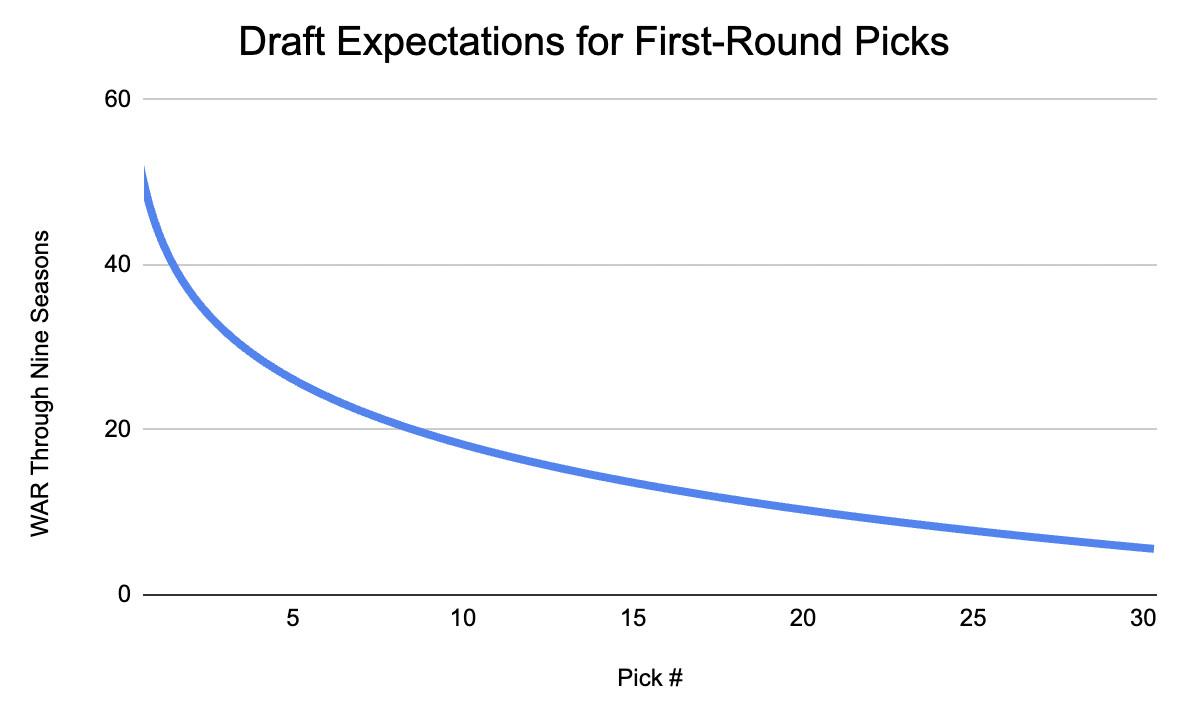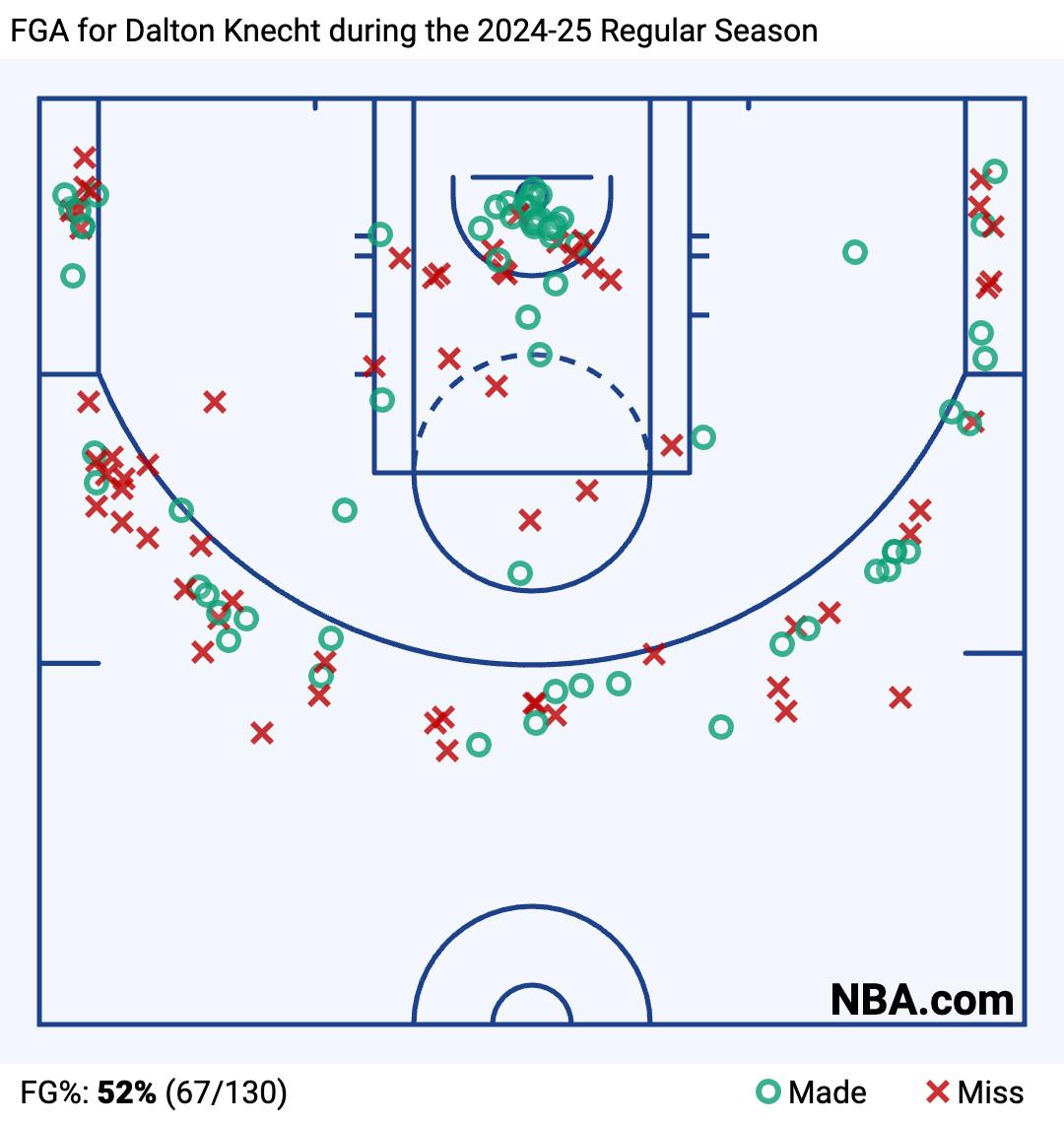Dalton Knecht might have the best nickname in the NBA. There are more important aspects of the rookie’s game—like his 45 percent 3-point mark—but in a league starved for creative and memorable monikers, “Knecht 4” is perfect.
Also perfect? Knecht’s fit with the Lakers, who, in desperate need of talent and spacing, selected the reigning SEC Player of the Year with the no. 17 pick in the 2024 draft. Knecht exceeded 30 minutes in a game for the first time on November 13 and since then has been nothing short of spectacular. He’s averaged 20.5 points and made 59.5 percent (!) of his 3-pointers over his past six games, and the Lakers—who play Phoenix in an NBA Cup game on Tuesday—are 10-6.
The highlight of this remarkable run came when Knecht caught fire against the Jazz, en route to 37 points, a rookie-record-tying nine 3-pointers, and one Jordan-esque shrug. Amid this surge, Knecht moved into second place in FanDuel’s Rookie of the Year odds.
Knecht happens to be teammates with a former Rookie of the Year, and that man spent Knecht’s hot streak against Utah dancing on the bench. After the game, LeBron James professed his disbelief that his Lakers had landed a player with Knecht’s ready-to-play skill set in the draft.
“I did not think he was going to fall to us,” James said. “I thought it would be impossible. I have no idea how that happened. But I’m very grateful, and I’m very happy that he’s here. I knew exactly what we were getting when he fell to 17.”
James added: “The other 16 teams fucked it up. Did anybody watch him?”
They probably did watch him, but they had one key concern. Although The Ringer, The Athletic, and ESPN all ranked Knecht in the top 10 of his class, according to a draft-night report, “A half-dozen NBA executives told ESPN that it was Knecht’s age—he turned 23 on April 19—and not concerns about his medicals or other reasons that primarily caused his slide.”
Were those executives right? Or did they, as LeBron put it, fuck it up? And as teams try to balance upside and polish when evaluating prospects, what does Knecht’s emphatic arrival say about how age affects NBA draft outcomes? Let’s investigate.
First things first: Knecht—who played five seasons across three different college stints, thanks to the extra year granted to athletes affected by COVID cancellations—is very old for a prospect. Now 23, he was in Anthony Edwards’s high school class, and he’s older than 21 players currently in The Ringer’s Top 100 Players ranking, including the past four Rookie of the Year winners.
History suggests that, despite his hot start, Knecht doesn’t have anywhere near the upside of many of those players. In the entire 21st century, only one 23-year-old draftee—Josh Howard, whom the Mavericks selected 29th in 2003—has made an All-Star team.
If we widen the age range to include 22-year-old draftees, we find a small group of eventual All-Stars from the early aughts—but only one first-round pick after 2007.
All-Stars Drafted in First Round at 22 Years or Older
This initial examination implies a very low ceiling for someone Knecht’s age. And while there are a few older second-round successes as well, they’re unique in both their playing styles and paths to NBA stardom. It would be hard for anyone else to replicate the careers of Isaiah Thomas, Marc Gasol, and Draymond Green, who were 22 when they were drafted.
Of course, an NBA draft pick can provide value even if he never goes on to make an All-Star team. Knecht is already providing value to the 2024-25 Lakers. So we decided to look at all draft outcomes.
To do so, we analyzed the draft classes from 2000 to 2016 and, using wins above replacement (based on Basketball Reference’s value over replacement player metric), calculated each first-round pick’s value through his first nine NBA seasons (to account for the entirety of a rookie contract and possible max extension). Those results give us a nice curve that shows the expected value for each draft slot (and it happens to look very similar to Kevin Pelton’s draft value chart at ESPN).

Then we compared each draftee’s actual value to the expected value from his pick number. For instance, the youngest first-round pick this century is Andrew Bynum, who was 17 years old when he went to the Lakers with the 10th pick in 2005. The draft curve suggests the average no. 10 pick is worth 18.3 wins above replacement through nine seasons, but Bynum was at 24.6, giving him plus-6.3 wins versus expectation.
We grouped players by their age at draft time (technically, we calculated each player’s age on July 1 of their draft year to keep things constant over time) and then compared the relative values of older, younger, and in-between draftees. And the first takeaway is clear: Older draft picks underperformed expectations, and no other age bracket comes close to missing the mark by as much as the 22-and-overs.
Relative Performance by Age, 2000-16 First-Round Draft Picks
That pattern is particularly pronounced for lottery picks. Older players taken among the top 14 selections collectively produced 45 percent less value than their draft slots implied. In other words, they were about half as valuable as expected.
Relative Performance by Age, 2000-16 Lottery Picks
(If we split up the oldest age group into 22-year-olds and 23-and-overs, the 23-and-overs—Knecht’s age range—would look even worse in these charts. Only eight 23-and-older draftees went in the lottery between 2000 and 2016, and they produced 73 percent less value than expected.)
This study looked at picks up through 2016, but it’s not as if recent examples are much more promising. On the whole, there is very little to get excited about from the collection of lottery picks 22 and older this century, which most recently features Ochai Agbaji (14th in 2022), Davion Mitchell (ninth in 2021), and Chris Duarte (13th in 2021). (For the full list, click here.)
Joakim Noah—who arrived in the NBA under unusual circumstances, as he probably would have entered the draft a year earlier if not for his desire to win a second college title at Florida—is the only standout star who came from this class of players. The best realistic outcome for most draftees this age has been to develop into a useful rotation player, typically a shooting specialist, à la Cam Johnson, Buddy Hield, or JJ Redick (now Knecht’s coach).
Later in the first round, older draft picks have performed better relative to their lottery counterparts—but they still fare the worst of any age group.
Relative Performance by Age, 2000-16 First-Round Draft Picks Outside Lottery
NBA teams know that older draftees don’t possess as much promise as younger ones, as the best, most talented prospects leave college early for the pros. Older first-round picks tend to be drafted much later than their younger counterparts. And yet older draft picks still underperform expectations, even accounting for their later selections.
That finding aligns the NBA with other sports leagues. In 2011, Baseball Prospectus analyst (and Ringer contributor) Rany Jazayerli used similar methods in a study of high school position players in the MLB draft, and he concluded that the youngest prospects in a draft class return more than double the value of the oldest prospects. As Jazayerli wrote, age has “a massive, massive impact” on draftee outcomes. He added, “And remember, this is even after adjusting for the fact that teams—at least some teams—may already be taking age into consideration and drafting younger players earlier than they would otherwise. They clearly don’t take age into account enough.”
The fact that Knecht fell so far in the 2024 NBA draft, even after he excelled in a power conference and ranked well among public analysts, suggests that NBA teams are now taking age into sufficient account during the drafting process. The number of age-22-and-older lottery picks has dropped drastically since the 2000s, and nobody in this age range has gone in the top half of the lottery (top seven picks) since Hield and Kris Dunn in 2016.
Have executives gone too far with their age discrimination? Perhaps—especially in such a weak draft, it’s possible that Knecht should have gone higher. But who should have nabbed him before he fell to the Lakers at no. 17? The 15 teams that chose players before Los Angeles in the 2024 draft (including the Wizards twice) can roughly be categorized as:
- Rebuilding: Wizards, Spurs, Pistons, Hornets, Trail Blazers, Jazz, Bulls
- Semi-contending: Hawks, Rockets
- Contending: Timberwolves, Grizzlies, Thunder, Kings, Heat, 76ers
The rebuilders weren’t going to take a 23-year-old draftee. The two semi-contenders weren’t either because they both had top-three picks that allowed them to seek greater upside. And of the prospective contenders, each had a reason to choose someone other than Knecht:
- Philadelphia is thrilled with Rookie of the Year favorite Jared McCain, taken one spot before Knecht.
- Memphis and Sacramento took different older rookies (Zach Edey and the since-injured Devin Carter, respectively, both 22 years old on draft day).
- Minnesota and Oklahoma City played the long game, each taking a guard (Rob Dillingham and Nikola Topic, respectively) four years younger than Knecht.
- Miami might have reasonably considered Knecht to be redundant with Tyler Herro, who’s in his sixth season but just a year older than the Lakers rookie.
After selecting center Kel’el Ware, who’s barely played thus far, Miami is the main team from that bunch that might regret its decision now—especially after the Heat just enjoyed a breakout season from Jaime Jaquez Jr., who was an older rookie.
But Miami of all teams knows that such early success doesn’t always last. Last year, it looked like, say, the Raptors might regret taking Gradey Dick ahead of Jaquez, but now Dick, who’s 2.5 years younger, looks like a superior long-term option. A few years earlier, an older Heat rookie—the undrafted Kendrick Nunn—finished second in Rookie of the Year voting. It turned out to be the best season of his career.
The lesson is for fans to not overreact when a more NBA-ready rookie gets off to a hot start—NBA development is measured not in weeks but in seasons. Over the past half decade, older rookies Nunn, Duarte, Jae’Sean Tate, and Eric Paschall made All-Rookie teams but faded soon after. Many of Knecht’s fellow 2024 draftees will be as old as Knecht is now at the end of their rookie contracts.
None of this is meant to deride Knecht’s early success with the Lakers. Unlike the 19-year-olds with higher future ceilings picked ahead of him in the draft, Knecht provides a prospective contender with immediate help. The Lakers’ offensive rating is 11.8 points higher with Knecht on the floor versus when he’s off, which is by far the largest margin on the team. L.A. is scoring 121.4 points per 100 possessions with Knecht, which would rank second in the league, while the team’s offensive rating without Knecht is 109.6, which would rank 25th.
The rookie forward has a beautifully modern shot chart, full of dunks and 3s and little in between.

Early indications are that he won’t be a massive bust at the very least, and that’s meaningful when so many other older draftees have flamed out in the NBA. Knecht was a late college bloomer with “impressive measurables at the draft combine,” and he looks like he’s on a path similar to that of Hield—one of the most prolific 3-point shooters in NBA history—or his coach, Redick, who carved out a long, productive NBA career.
It helps that Knecht found himself in an ideal landing spot in Los Angeles, both because he can take advantage of opposing defenses’ focus on LeBron and Anthony Davis and because the Lakers are a solid developmental organization. To use the obvious comparison, Austin Reaves was 23 when he joined the Lakers as an undrafted free agent, and he’s now a back-end top-100 player in the NBA (though he’ll probably never be an All-Star).
But the idea that Knecht is following in Klay Thompson’s footsteps, or that he can grow into an eventual costar for Davis and/or an ageless LeBron? There’s no precedent for any development of that sort.
Because of his age and skill set, Knecht is bumping up against his likely ceiling more than any other rookie. It’s unclear how he’ll ever contribute beyond scoring and spacing. Knecht ranked only 35th among 2024 draftees in Pelton’s stats-based projections because of both his age and his one-dimensional college production. At least so far, that hasn’t changed much in the NBA, where Knecht is averaging just 2.8 rebounds, 1.1 assists, 0.4 steals, and 0.0 blocks per game.
While Knecht can score, opposing teams will attack him mercilessly on the other end until he proves he can stop them. He’s displayed minimal ability to do so thus far. Out of 236 players with at least 250 minutes played this season, Knecht ranks 233rd in stocks (steals plus blocks) per 36 minutes.
If Knecht’s game is effective but limited, then it parallels the overall lessons from his first month in the NBA. Effective in the sense that Knecht’s fall to 17th in the draft was great for the Lakers, great for Knecht himself, and great for LeBron. But limited because it shouldn’t change how NBA teams view the concept of upside or how they evaluate older prospects in future drafts.
Thanks to Mike Lynch of Basketball Reference for assistance with player birth dates.

